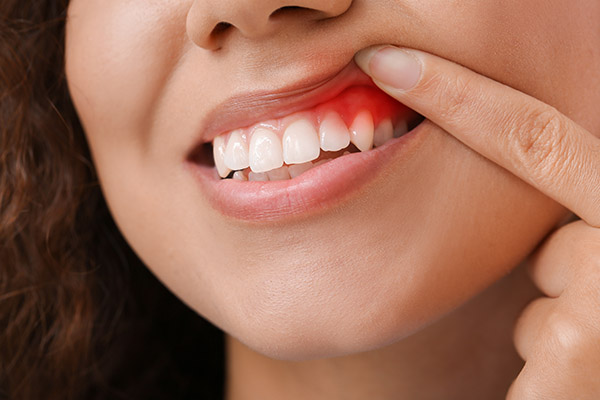Treating Gum Disease If You Have Gingivitis

Gingivitis is a form of gum disease that causes swelling where the gums meet the teeth. It is a serious condition that should be treated as soon as possible. Early diagnosis and treatment can prevent further oral health issues, including oral functions, loose teeth, and potential tooth loss.
Causes and symptoms of gingivitis
Gingivitis can occur when plaque is not properly removed and starts to build up on teeth. Over time, the sticky film can harden into a substance known as tartar, which can only be removed during a professional cleaning by a dentist or dental hygienist.
Common symptoms of gingivitis include bleeding or swollen gums, persistent bad breath, receding gums, and sensitive teeth. When experiencing these symptoms, it is important to see a dental professional immediately. Gingivitis must be treated to prevent further decay of the teeth and the risk of gum infection. When left unaddressed, it can also lead to other health issues.
Treating gingivitis
Fortunately, treating gingivitis can reverse symptoms, though it cannot restore damage to the bone that has already occurred. The typical treatment plan includes cleaning, dental restoration, and ongoing care.
Professional cleaning
The professional cleaning removes any tartar and plaque that has built up on the teeth. This is accomplished by scaling and root planing. Scaling removes tartar and bacteria, while root planing smooths root surfaces and removes bacterial products causing inflammation. To perform these tasks, the professional may use a laser or ultrasonic device.
Restoration
If restoration is advised, any issues that make caring for the teeth more difficult can be corrected. This includes straightening teeth and replacing crowns and other dental fixtures.
Preventing future gum infection
Gingivitis is preventable. There are many factors that contribute to the condition, and knowing the causes can help stop future episodes of gum disease. These preventative measures and habits to avoid can maintain good gum health:
- Brush teeth at least two times a day
- Floss teeth at least once a day
- Avoid smoking and other tobacco products
- Use an electric toothbrush with soft bristles for a better cleaning
- Avoid overconsumption of sugary and acidic food and drinks
- Replace toothbrushes or electric toothbrush heads every three months
- Schedule a regular dental checkup once a year
Using mouthwash can reduce bacteria and keep breath smelling good. A natural mouthwash that can be made at home is a saltwater rinse. Because salt is a natural disinfectant, it can help heal gums that have become inflamed. It may also reduce the amount of bacteria in the mouth.
Schedule your next dental visit to prevent gingivitis
Gingivitis is a preventable oral health condition. By following a thorough oral health routine and avoiding the overuse of sugar and tobacco products, your teeth and gums are more likely to stay healthy. If you have been experiencing bleeding or swollen gums, you should make an appointment with a dental professional as soon as possible to prevent further health issues. Call our Brooklyn office to learn more or schedule your next visit.
Request an appointment here: https://www.myddsny.com or call Inna Goykman-Amir DDS at (718) 416-6364 for an appointment in our Brooklyn office.
Check out what others are saying about our dental services on Yelp: Gum Disease in Brooklyn, NY.
Related Posts
Gum disease is an inflammation of the gums and the tissues surrounding it, primarily caused by poor oral hygiene. According to a study conducted by the National Institute of Dental and Craniofacial Research, over 80 percent of adults have some form of gum disease, and over 90 percent of those who have it do not…
A laser dentist offers a modern approach to treating gum disease, using advanced technology that reduces discomfort, speeds up healing, and improves patient outcomes. Early detection and gentle treatment make a significant difference in the first stages of periodontal care. Laser dentistry allows for precise, minimally invasive care that preserves healthy tissue and enhances long-term…
Learning what laser dentistry is and how it works is something every dental patient should do, as this allows them to make treatment choices that are right for them. Modern-day dentistry has allowed for the evolution of so many kinds of dental advancements, including laser dentistry, which has been proven to produce successful results for…
Practicing preventive dentistry is an effective way to establish good oral health. Strict personal oral hygiene practices result in fewer dental problems. Strengthening these practices with regular dental appointments makes preventive dental care even more efficient. Preventive dentistry becomes even more effective by avoiding some bad habits.This habit increases the risk of chipping teeth. It…


